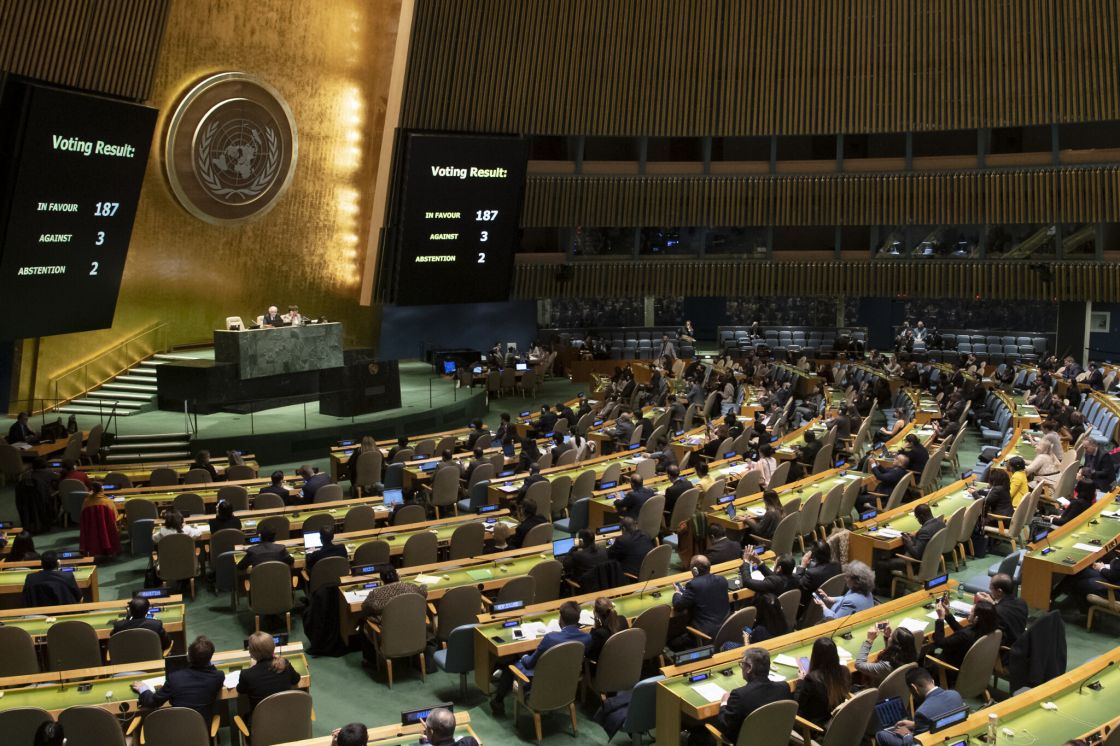- Articles
- Posted
Once Again, the US and the Zionist Entity, Isolated in the UN
The signs of American isolationism are continuously growing, becoming more frequent, and extending to more platforms on the international stage. The manifestations of this isolation are on the rise domestically or in terms of the US’s external relations, whether bilaterally with a growing list of countries or within international bodies and organizations.
Hardly any week passes by without the US making the news in a way that reflects an antagonistic attitude to the rest of the world, including historical “friends” or “allies”. One forum where this is becoming hard to miss is the UN system, with plenty of examples where the US finds itself alone against everyone else. One forum where this has happened repeatedly over this past year is in the UN Security Council, where the US either vetoed a resolution that everyone else voted for or proposed a resolution that got support from no one else.
On Wednesday, 30 December, the US alone with its Zionist sidekick, “Israel”, voted in the UN General Assembly against the proposed UN 2021 budget, with 151 votes in favor and one abstention. A move that has no effect whatsoever other than to serve as further proof with crystal clarity of where the US stands on the world stage. It should be noted that Sudan abstained from voting – something that also does not go unnoticed in the context of the normalization wave that has started in the region and the US’s promises to take Sudan off its list of states designated as sponsor of terrorism.
The US and “Israel” voted against the budget alleging that it perpetuates anti-Semitism and anti-“Israel” bias, as it includes funds for a follow-up event to the Durban Conference on its 20th anniversary. To recall, the Durban Conference or the World Conference against Racism, was held under UN auspices in 2001 in Durban, South Africa. One of the issues that the conference covered was the Palestinian issue, and the conference’s draft document linked Zionism with racism. This drew sharp objections from the same duo – the US and “Israel” – both of which withdrew from the conference, though the text to which they objected ended up being removed from the conference’s final document.
These kinds of showy movements, which are meaningless and pointless with regards to the issue at hand, are nevertheless quite telling about the place in which the US stands with respect to the rest of the world, which is on one side of a valley that is continuously getting deeper and wider, with a sharply decreasing number of allies.
As this isolation has increased sharply over the last few years, some are quick to attribute it to Trump and his erratic personality as reflected in the policies he adopted during his presidency. However, a quick scan of US policies and practices for decades, but particularly since the beginning of this century, reveals this as a trend that has been adopted by the US as a whole, regardless of who is in the White House or the majority party in Congress. Notably, this path down which the US is going speedily, is a one-way road, and the only way for the US to get off it means a radical change to the policies that have shaped the US for decades, even a century.
That is something that we believe we will start seeing the first signs thereof, first on a small scale, but then increasingly, when the US isolation from the world reaches a point that can no longer be bearable in terms of its domestic effects. In either case, the US will more and more expose the crux of its nature as an international plunderer, to allies and foes alike, especially Europe, which is taking a completely different path than the US in dealing with countries the US classifies as “enemies”.
This is already happening, in examples like the recent EU-China Comprehensive Agreement on Investment, while the US delists Chinese companies from its stock exchange and bans dealing with them. Another example is the Joint Comprehensive Plan of Action, also known as the Iran Nuclear Deal, from which the US withdrew and later tried to propose a UN Security Council resolution to extend an arms embargo on Iran, the response to which was a resounding rejection from 13 of the 15 members of the Security Council.
Regardless of what the US does in these cases, it will be humiliated.
The first path is to continue to stand alone in the corner with very few allies with very little to no weight economically or politically, which will have negative repercussions on the US on both fronts, while those it declares as enemies are able to survive without its “blessings” or “stamp of approval”.
The second path is to retract its position and join in with the rest of the world, which means yet another big blow to its “supremacy” on the world stage.
In either case, the US dethroning process is irreversibly underway, and the only thing that the US might be able to do is slow it down, but not stop it or reverse it.



 Reem Issa
Reem Issa